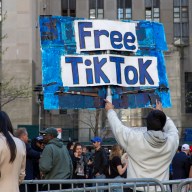TORONTO – It seems that a lot of TV watching these days involves … well, a lot of watching.
“The Mentalist,” “Lie to Me,” “Psych” and Canada’s own “GoldMind” all feature astute observers who make a living from their keen powers of observation and deduction.
“(There’s) a lot of mentalism on television and I’m very happy about this,” says Haim Goldenberg, the Israeli-born, Toronto-based star of the reality show “GoldMind” that airs Sundays on TVtropolis.
“It’s good for my business.”
Films featuring characters with special mental powers are also popping up. Last year’s “The Great Buck Howard” starred John Malkovich as a mentalist based on the Amazing Kreskin, and the upcoming “Sherlock Holmes” has Robert Downey Jr. playing the iconic super sleuth.
“If you see the great Sherlock Holmes movies, the ones with Basil Rathbone, and read all of (Arthur) Conan Doyle’s works, he just had insight into people by observing what they wore, what the clay was on their feet and so forth,” Kreskin, born George Joseph Kresge, Jr., said in a recent telephone interview from his office in Montclair, N.J.
“This is really … a throwback to an earlier whodunit,” he says of the recent mentalism trend.
Unlike most of those characters, Goldenberg doesn’t use his abilities to help police forces detect if people are lying and solve crimes.
He says he did that a few times back in Israel and is asked about once a month to do the same thing here, but his goal these days is just to entertain people and “make them think a little bit different.”
He says there are two forms of mentalism.
“One is to put information in your mind, to influence you to do something, to think something; the other thing is to take information from you,” explains Goldenberg, who performs mind tricks on strangers on “GoldMind.”
“People call it telepathy or mind reading. I don’t believe in those terms. I don’t believe that I can read people’s minds, but if I use my intuition and I know what you’re thinking in a specific moment, it can look like mind reading.”
Kreskin says he’s been helpful in about a third of the approximately 85 police cases he’s helped out with in the U.S., but he doesn’t like the nature of the work.
“I could never make my work full time in law enforcement. It’s too heartbreaking,” says Kreskin, a psychology major whose 1970s TV series, “The Amazing World of Kreskin,” was filmed in Ottawa. He’s now writing his 16th book.
“My work deals with how people think and tuning in to them and I’d be walking away beset by the tragedies and what have you because it’s so heart wrenching.”
So just why are we so interested in mentalism these days?
“First of all, people are tired from magic,” surmises Goldenberg. “Magic is the old thing and now mentalism is the new wave, maybe. On a deeper level, he thinks the trend reflects a yearning for mystery in an age where nearly everything is explained online.”
“We want to see something that we don’t have (answers) to,” he says. “This is, in my opinion, the reason that people are attracted so much to mentalism. We still want to wonder, we still want maybe to believe in magic.”
Kreskin also points to people misrepresenting themselves on the Internet. That’s created increased interest in behavioural science and learning how to detect lies in others, he says.
It’s also a sign of the economic woes, he adds.
“There has always been a tremendous amount of interest in related areas dealing with the inner mind, the inner soul, the intuitive areas and also the hereafter before, during and a few years after recessions or world wars,” says Kreskin, 74.
Although Goldenberg believes anyone can do what he does if they believe and practise enough, Kreskin says viewers shouldn’t count on becoming lie-detection experts.
Courses that claim to teach people to detect if one is lying are “a collasal, gigantic, immense waste of time,” he says.
“For reasons that scientists don’t understand, the amount of people that can be taught to learn to detect if people around them are lying is about one per cent of civilized man – no more than one or two out of every 100 people – because most people don’t have that level of intuitiveness.”
CBS’s “The Mentalist” airs Sundays on CTV in Canada; Fox’s “Lie to Me” airs Wednesdays on Global; and “Psych” is on the USA Network.
















